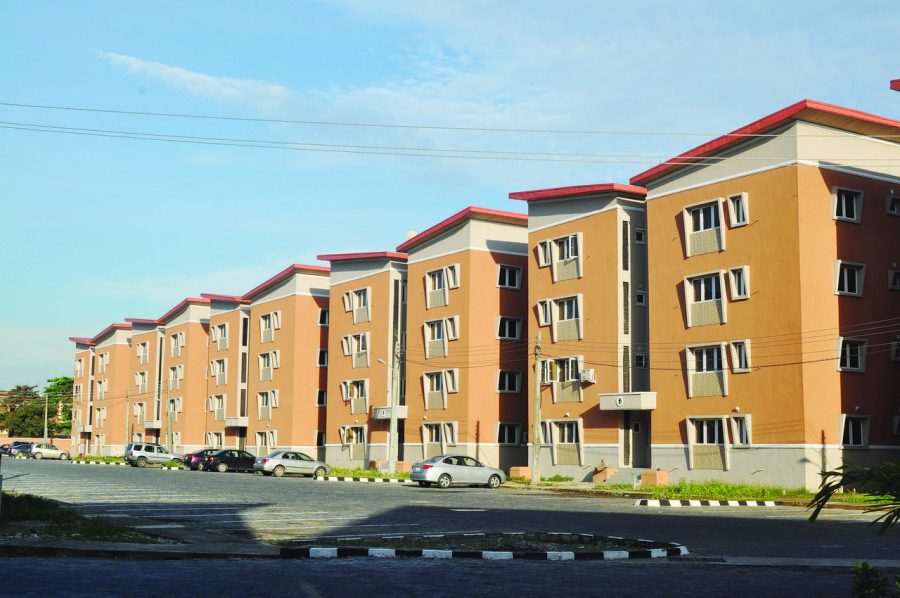General
FG plans N3.53trn investments by 2025 to tackle 17m housing deficit
Published
4 years agoon

The federal government is planning fresh investments of N3.53 trillion in the Nigerian housing sector to address the 17 million housing deficit in the country.
The investment is to be made within the next four years as part of strategies of government to boost housing delivery and guarantee affordable housing for Nigerians.
Read Also:
These allocations, according to findings, have been made to priority projects in the sector as well as projects essential to the operations of the relevant ministries, departments and agencies (MDAs).
Details of the four-year plan are contained in the National Economic Development Plan of the federal government launched recently by President Muhammadu Buhari
The document 195-paged seen by Business Metrics shows that the N3.53 trillion investment includes an estimated public investment in the development of urban road of about N1.68 trillion.
Nigeria has experienced rapid yet uncontrolled urbanisation, which has put intense pressure on an already stretched housing infrastructure.
Nearly 50 per cent of Nigerians currently reside in urban areas, which represents almost 100 million people.
Challenges
Over the years, housing supply constraints and asymmetric information on existing housing policies have prevented Nigeria from keeping up with the rapid urbanisation rate.
Also, lack of policy continuity arising from political risk and change of government over the years have stifled government efforts, thus, explaining the gap between the availability of affordable housing and the demand due to rising population.
Furthermore, the sector faces other hurdles such as proper land administration constraints; weak adherence to real estate market regulations; unhealthy speculation by stakeholders in the sector; low private sector involvement, poor housing database and mapping constraints as well as rising cost of building materials.
According to the Federal Government, these challenges have all contributed to severely curtailing access to land despite the government’s best efforts to reform the mortgage sector.
Planned Respite
However, the government’s blueprint for the sector covering 2021-2025 stated that despite these challenges, the increasing demand for housing because of rapid urbanisation could be leveraged as a considerable engine for growth.
It stressed that building affordable houses to fill the shortfalls will increase demand for housing-related financing and drive liquidity of mortgage finance products.
According to the document, massive housing construction will also significantly boost demand for locally crafted materials to reduce construction costs as well as stimulate job creation, particularly in the construction and manufacturing sectors of the economy.
To improve access to affordable housing in Nigeria, the document stated that between 500,000 and one million houses will be delivered annually within the next four years.
The document also stated that the government will improve linkages between the housing sector and the economy with emphasis on improving urban development across the country.
“To achieve the goals outlined in the housing sector, the estimated public investment is N3.53 trillion from 2021-2025. This includes an estimated public investment in the urban road development of about N1.68 trillion.
“These allocations have been made to priority projects in the sector as well as projects essential to the operations of the relevant MDAs.
“Both federal and state governments will make the construction of affordable housing a priority to bridge any housing deficit, reduce slums and create opportunities for sustainable urban regeneration in Nigeria,” the document pointed out.
It further stated that securing the availability of long-term housing financing to facilitate access to home ownership for everyone will ultimately improve social inclusion and allow low-income Nigerians to build wealth.
“The achievement of these goals will be underpinned by an inclusive national housing policy that will fully unlock the socio-economic potential of the housing and urban development sector.
“The operational efficiency of the Federal Mortgage Bank and the Family Homes in collaboration with the Primary Mortgage Banks and the private real estate firms will be a priority,” it added.
1.6 billion Endangered by 2025
As housing deficit remains a global problem, an estimated 1.6 billion people (one-third of the world’s urban population) are expected to face affordable housing challenge by 2025.
Failure to take decisive and coordinated action now, will only result in further widening of the gap between available affordable houses and the corresponding demand.
The government noted that Nigeria is the most populous country in Africa and has a rising urbanisation rate.
“This further explains the rising demand for affordable housing that may cause a widening housing gap on an annual basis without a targeted policy intervention.
“As the economy is in a stagflation phase exacerbated by the COVID-19 pandemic, the housing sector has the potential to become one of the main drivers of economic growth,” it noted.
Last line
Access to safe and proper shelter is essential for human existence and survival. Provision of housing can impact the economy by creating jobs, promoting socio-cultural integration, improving healthy living and life expectancy which all foster inclusive economic growth.
Share this:
- Click to share on X (Opens in new window) X
- Click to share on Facebook (Opens in new window) Facebook
- Click to share on WhatsApp (Opens in new window) WhatsApp
- Click to share on Pocket (Opens in new window) Pocket
- Click to share on Telegram (Opens in new window) Telegram
- Click to email a link to a friend (Opens in new window) Email
- Click to share on LinkedIn (Opens in new window) LinkedIn
